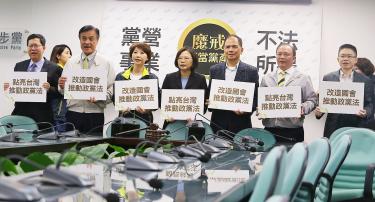On Dec. 9, the Democratic Progressive Party’s (DPP) Central Standing Committee identified 11 “difficult” electoral districts where no DPP candidates would run. Instead, the party would support non-DPP candidates and the creation of a progressive alliance in these areas. Still, there have been complaints from the party’s grassroots.
|
|||
|
|
|||
| Page 758 of 1520 |
Newsflash
|
A group of people under the age of 23 yesterday called for an amendment to the Constitution to allow political participation by younger people and panned the electoral system for blocking the economically vulnerable from running for office by requiring a security deposit. More than a score of young people, with an average age of 19, protested outside the Legislative Yuan in Taipei yesterday against restrictions that they said discriminate against youth political participation by setting the minimum voting age at 20 and the minimum candidate age at 23. |












